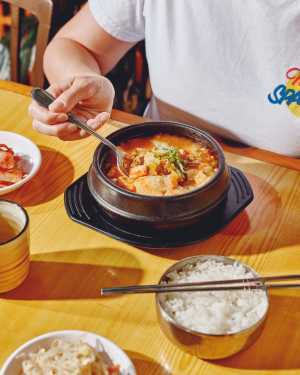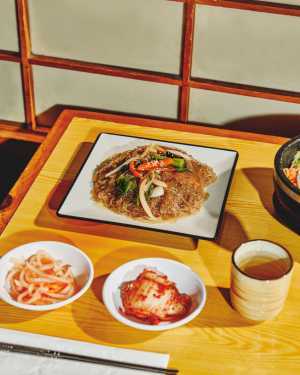When Ok Re Lee, the indomitable matriarch of Korean Village Restaurant, passed away in 2019, Toronto lost a culinary pioneer. Over a thousand people gathered at her two-day funeral to honour and celebrate the life of the woman who boldly introduced a then-homogeneous Toronto to vibrant flavours of kimchi, bulgogi and haesam bokkeum (stir-fried sea cucumber). Korean Village Restaurant’s 46-year legacy makes the Bloor West destination the longest-standing Korean restaurant in Toronto, a testament to Ok’s magnetic charm and vision.
“She wasn’t your typical restaurant owner,” says Jason Lee, Ok’s eldest son, who took over Korean Village Restaurant after his mother passed unexpectedly from an aneurysm. “Back in South Korea, my mom was a famous actress in K-dramas. Even after moving to Canada to start a new life with my dad, she always maintained that movie star elegance. She would clear tables wearing beautiful dresses and fur.”
In 1978, Ok moved to Toronto, using her savings from her acting career to help open Korean Village Restaurant. Jason reflects on the motivation behind his parents’ seemingly whimsical decisions. “My dad [Ke Hang Lee] was a phys-ed teacher in Korea, and even today, I don’t know why my famous mother married him or why they decided to open a restaurant with no food experience. I don’t even know why they left Korea for Canada. They never talked about it,” he explains. With his father’s passing this June, Jason has come to terms with the fact that some things will always remain a mystery.
Although Jason worked alongside Ok for almost 20 years — his dad quietly supporting in the background — taking over filled him with anxiety. “I was thrust into the role of owner. My mom was the ultimate boss; every decision, big or small, went through her,” he recalls. But Jason knew he couldn’t run Korean Village Restaurant the way Ok had: “Her management style was archaic: no POS system, everything handwritten, and the menu — 13 pages, 220 items, no photos — was a frickin’ novel. We had to modernize to survive.”
Jason Lee took over Korean Village on Bloor Street West after his mother, Ok Re Lee passed away
Ashley van der Laan
This family-run restaurant has long been a community pillar, planting the South Korean flag on Bloor Street long before it was known as Koreatown. People have a strong attachment to Korean Village Restaurant, so Jason knew any change would be met with resistance. But in the year after Ok’s passing, change came knocking, whether they were ready for it or not.
The pandemic turned everything upside down, forcing Jason to lay off most of his staff and tie on a chef’s apron himself. “I’m relieved my mom never had to endure the pandemic — seeing the place empty would have broken her heart,” he says. “She probably would have gone into debt just to keep everyone on payroll.” Thankfully, Jason’s stewardship during this time, as well as support from the community — including friends working for free — kept the restaurant serving up simmering bowls of bibimbap.
Before making any sweeping changes, Jason reflected on his mom’s lessons: always prioritize food quality and treat customers as guests. “For me, that translated to a love for the food and a love for the people,” he says. His mother showed love by offering a cornucopia of Asian food, including sushi, Chinese dishes and rare Korean fare. “But with inflation and staffing shortages, that just wasn’t sustainable.” So, Jason pared the menu down to 30 dishes, ensuring everything was the freshest, most authentic presentation of Korean food. Everything, from the kimchi to the lightly smoky gochujang, was made in-house, ensuring it all had the Lee family’s signature touch. He jokes, “My mom wanted to offer people the world; I just want to offer the best of Korea.”
Korean Village Restaurant's most iconic dishes
Soondubu

Ashley van der Laan
“This is one of my wife’s favourite stews. It’s made with silken tofu, kimchi, seafood (shrimp, squid) and mixed vegetables (cabbage, zucchini, onions). It’s both delicate and spicy, with umami from the seaweed cooked into the dashi-based broth.”
Banchan
Ashley van der Laan
“We serve three banchan (complimentary side dishes) to every table. Our house-made kimchi gets its tangy flavour from a two-week fermentation and fish sauce (we skip the shrimp due to allergies). Our bean sprouts are flash-boiled, cooled and seasoned with salt, pepper and sesame oil. And, the shredded potato salad is made by thinly slicing russet potatoes and stir-frying with salt, pepper and oil. Sometimes, we serve quick-pickled daikon if we run out of potatoes.”
Korean BBQ
Ashley van der Laan
“Our bulgogi and kalbi are the stars of our Korean BBQ. Marinated for over 35 hours with soy sauce, sugar and a few secret ingredients, the bulgogi — thinly hand-sliced sirloin beef — is lean, tender and juicy. Our kalbi (short ribs) has a different, slightly sweeter marinade, and the meat is beautifully marbled.”
Japchae

Ashley van der Laan
“Made with sweet potato starch noodles, japchae is a Korean staple for birthdays, marriages and graduations. This iconic dish symbolizes longevity and prosperity, always showing up at special occasions. We stir-fry the glass noodles with sesame oil, sugar, peppers, spinach, onions, mushrooms and toasted sesame seeds. We opt to use gluten-free soy sauce, making this another dietary restriction-friendly dish.”
Fried Tofu Bibimbap
Ashley van der Laan
“This bibimbap comes sizzling in a hot stone bowl with seasoned rice, radish, carrot, cucumber, zucchini, sweet potato and spinach. Topped with a fried egg, crispy tofu, sesame seeds and nori, it gets a sweet and smoky kick from our homemade gochujang. The stone bowl’s heat gives the rice a delicious crusty bottom.”
